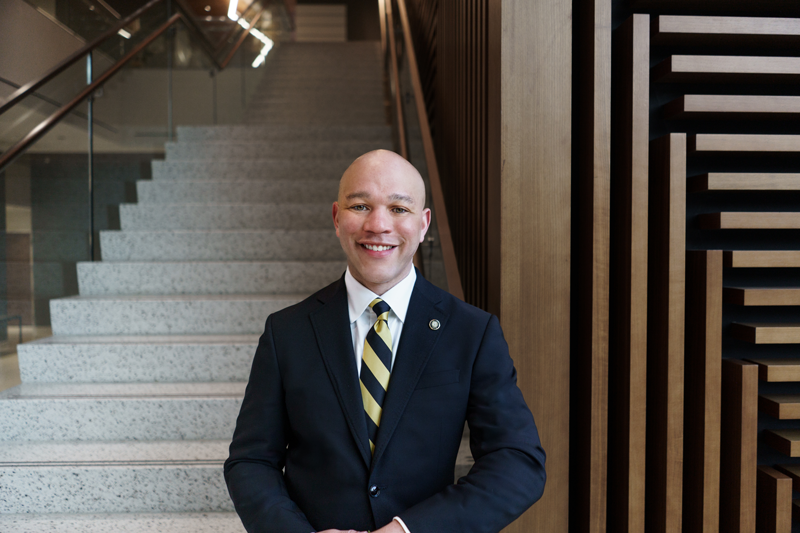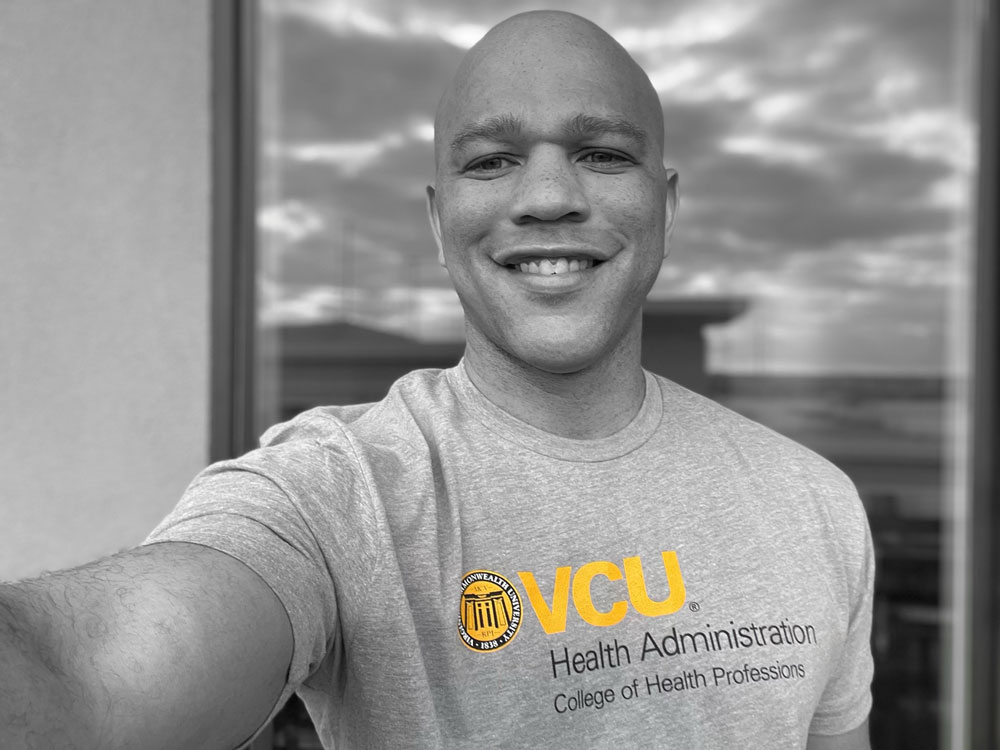Being the change
New Health Administration faculty leader aims to produce graduates who cultivate an environment of belonging for all people
By Malorie Burkett
VCU College of Health Professions
mgburkett@vcu.edu
January 24, 2022
Virginia Commonwealth University’s College of Health Professions is known for attracting the highest level of faculty who are influential thought leaders and experts in their respective disciplines. And this month, the College welcomes Stephan Davis, DNP, MHSA, FACHE, an award-winning healthcare leader and educator, as the new assistant dean of diversity, equity, and inclusion; and executive director of inclusive leadership education in the Department of Health Administration.

Stephan Davis, DNP, MHSA, FACHE, is the new assistant dean of diversity, equity, and inclusion; and executive director of inclusive leadership education in the Department of Health Administration.
Davis’ passion for and work related to diversity, equity, and inclusion has been informed by many of his lived experiences. The son of Black parents who were raised in the civil rights era, he grew up learning about racial injustice. As a teenager in St. Louis, Missouri, he also learned through painful experiences that he would face challenges in navigating the world both due to race and as a member of the gender and sexual minority community. At 17, Davis left the Midwest to study jazz performance in New York City. After a year in New York that was filled with profound and affirming experiences, as well as moments that made clear the work toward social justice that still needed to be done, Davis was convinced that while he would always continue to play saxophone and write music, his academic focus would shift to areas where he could make a greater impact to improve health and alleviate human suffering.
Davis went on to study nursing at the University of Maryland, Baltimore. During his time in nursing school, he worked as a student nurse extern in the pediatric intensive care unit at University of Maryland Medical Center – the same institution where Bill Flanigan and Robert Daniel, a gay couple, had been discriminated against when Daniel was at the end of life. Despite their domestic partnership in the state of California, and Flanigan holding durable power of attorney - enabling him to make end of life decisions for Daniel, the hospital staff denied Flanigan the right to see Daniel or make decisions in accordance with his partner’s wishes.
"Cases such as these, moved me to pursue healthcare leadership, so that I could be a part of the change that is so desperately needed for our field,” said Davis.
Upon graduation from nursing school, Davis began working clinically in the post anesthesia care unit at Washington Hospital Center while also pursuing a master’s degree in health systems administration at Georgetown University. In less than a year, he entered his first leadership role as director of the health workforce innovation project, a $500,000 grant as a result of a unique partnership between the D.C. department of employment services, MedStar Georgetown Hospital, and Georgetown University to prepare unemployed D.C. residents for entry-level roles that typically had high turnover. Davis says this project, at the intersection of government programs, healthcare delivery, and academia, was impactful for his leadership trajectory.
Davis spent more than a decade in progressively responsible leadership positions, overseeing quality functions such as utilization management, case management, disease management, accreditation readiness, clinical and process improvement, as well as workforce-development areas such as organizational learning and academic-practice partnerships.
 Throughout his career, he has been a champion for advancing DEI and improving healthcare quality and access for the underserved. From volunteering as a registered nurse for an LGBTQ+ clinic at the beginning of his career, to serving on the board of directors for a Federally Qualified Health Center that primarily served people living with HIV/AIDS, to leading organizations to achieve designation for LGBTQ healthcare equality with the Human Rights Campaign (HRC), much of Davis’ work has been dedicated to making healthcare more inclusive for some of the people and populations who need care the most, but who can rightly be fearful to seek services due to stigma and discrimination.
Throughout his career, he has been a champion for advancing DEI and improving healthcare quality and access for the underserved. From volunteering as a registered nurse for an LGBTQ+ clinic at the beginning of his career, to serving on the board of directors for a Federally Qualified Health Center that primarily served people living with HIV/AIDS, to leading organizations to achieve designation for LGBTQ healthcare equality with the Human Rights Campaign (HRC), much of Davis’ work has been dedicated to making healthcare more inclusive for some of the people and populations who need care the most, but who can rightly be fearful to seek services due to stigma and discrimination.
Despite numerous past examples of discrimination in care delivery settings, Davis believes that all institutions regardless of their history can make meaningful progress toward inclusion. For instance, University of Maryland Medical Center, an institution highlighted for same-sex partner discrimination at the turn of the century, subsequently became recognized as a leader in LGBTQ Healthcare Equality with HRC – a testament to the powerful change that can occur when inclusive leaders are guiding health systems to advance DEI. “This is exactly what inclusive leadership education is all about”, said Davis.
Being able to focus on contributing to department and College related efforts to produce graduates who embody principles of inclusive leadership and who are empowered advocates for meaningful change is part of what led him to VCU.
“When I first met Dean Susan Parish, and she shared her vision for the College, it was really refreshing to hear that DEI is among her top priorities,” said Davis. “Also, having known Dr. Paula Song, chair of the Department of Health Administration, through the Association of University Programs in Health Administration (AUPHA), I was convinced long before my interview at VCU that she shared a deep, meaningful and action-oriented commitment to advancing DEI in healthcare leadership.”
“Stephan brings a truly exceptional mix of clinical, executive, and academic experiences to this role,” said Paula Song, Ph.D., Richard M. Bracken chair and professor in the Department of Health Administration. “I’m confident that his firm commitment to DEI and inclusive leadership education will help the department develop leaders that reflect the diversity and voices of the communities they serve.”
With regard to his role as the department’s very first executive director of inclusive leadership education, Davis believes in producing leaders who cultivate environments where all people can experience belonging and thrive.
When asked what this new area of focus for the department would entail, Davis explained “as we look at inclusive leadership education, all stakeholders within our health administration learning community will be engaged to establish a co-created vision and philosophy that describes our *’active, intentional, and ongoing engagement with diversity’ as we continue to pursue inclusive excellence. In addition to designing meaningful educational experiences related to DEI for all health administration students, there will be particular focus on supporting students from historically underrepresented and excluded backgrounds in navigating systems and institutions that have not always been created with us in mind.”
Davis has hit the ground running with regard to this type of educational programming. On Feb. 25 at noon (EST), he will be hosting and moderating a Black History Month webinar featuring prominent Black healthcare leaders entitled “Black and Golden: Leveraging Black Identity as an Asset in Healthcare Leadership.”
Related to his role as assistant dean, he looks forward to working with Dr. Angela Duncan, associate dean, to advance diversity, equity, and inclusion for the College. “When I met Dr. Duncan, I immediately felt connected to her energy, passion, and drive to make meaningful change for the College and university,” said Davis.
“When I saw Dr. Davis’ interview presentation on simulating patient bias in care delivery settings, which featured a case of racial discrimination against a clinician and the moral, ethical, and legal implications, I knew that he was someone we needed on our team” said Angela Duncan, Ph.D., associate dean for diversity equity, and inclusion for the College. “The College has been working to provide an infrastructure to do the work of DEI, and I am excited that Dr. Davis is here to help push this work even further. I look forward to working alongside him as we continue to champion transformational change and create new opportunities for everyone.”
Prior to coming to VCU, Davis served as director of the Master of Health Administration program, assistant professor of health administration, and chair of diversity, equity, and inclusion at the University of North Texas Health Science Center, School of Public Health in Ft. Worth, Tex. A fellow and national faculty member for the American College of Healthcare Executives (ACHE), he is the immediate past chair of the ACHE LGBTQ Healthcare Leaders Community and has served as an ACHE Regent-at-Large, a role created to foster diversity in the governance of ACHE. In addition, he serves as chair of the Quality and Safety Faculty Forum for the Association of University Programs in Health Administration (AUPHA). His DEI-related work in academia includes serving as an invited conferee for the Macy Foundation conference on Addressing Harmful Bias and Eliminating Discrimination in Health Professions Learning Environments, which culminated in a report of recommendations released in September of 2020.
Davis holds numerous board certifications, including credentials in healthcare quality, finance, strengths-based coaching, nursing leadership, and academic nursing education. He received his Bachelor of Science in Nursing from the University of Maryland; a Master of Science in Health Systems Administration from Georgetown University in Washington, D.C.; and his Doctor of Nursing Practice in Healthcare Leadership, Systems and Policy from Yale University in New Haven, CT.
*Reference – Clayton-Pederson, A., Clayton-Pederson, S. (2012). “Making excellence inclusive” in education and beyond. Pepperdine Law Review. 35 (3), 611-648.